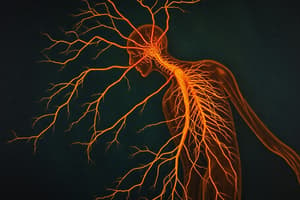Podcast
Questions and Answers
What type of neuron transmits information from the receptor to the central nervous system?
What type of neuron transmits information from the receptor to the central nervous system?
- Motor Neuron
- Interneuron
- Efferent Neuron
- Sensory Neuron (correct)
Which component of the reflex arc is responsible for connecting sensory and motor pathways?
Which component of the reflex arc is responsible for connecting sensory and motor pathways?
- Sensory Neuron
- CNS
- Effector
- Interneuron (correct)
What type of receptor responds to thermal changes?
What type of receptor responds to thermal changes?
- Mechanoreceptors
- Photoreceptors
- Chemoreceptors
- Thermoreceptors (correct)
In a reflex arc, which component acts to produce the response by activating muscles or glands?
In a reflex arc, which component acts to produce the response by activating muscles or glands?
Which of the following statements accurately describes a reflex action?
Which of the following statements accurately describes a reflex action?
Which type of receptor would respond to intense pressure?
Which type of receptor would respond to intense pressure?
What is the primary purpose of a reflex arc?
What is the primary purpose of a reflex arc?
Which of the following correctly lists the components of a reflex arc in order?
Which of the following correctly lists the components of a reflex arc in order?
Study Notes
Reflex Arc Overview
- The reflex arc is a neural pathway controlling reflex actions, which occur without brain involvement.
- It consists of sensory, interneuron, and motor neurons designed to transmit information rapidly from receptors to effectors.
- Its primary function is to minimize bodily harm from potentially dangerous stimuli.
Types of Sensory Receptors
- Thermoreceptors: Detect temperature variations.
- Photoreceptors: React to light stimuli.
- Chemoreceptors: Respond to chemical changes.
- Mechanoreceptors: Sensitive to pressure, touch, and vibration.
- Nociceptors: Indicate pain by responding to harmful stimuli.
Components of the Reflex Arc
- Receptor: Detects the stimulus.
- Sensory Neuron (Afferent Neuron): Transmits sensory information to the central nervous system (CNS).
- CNS (Spinal Cord): Contains interneurons that process the sensory input.
- Motor Neuron (Efferent Neuron): Relays instructions from the CNS to effectors.
- Effector: Muscles or glands that carry out the response to the stimulus.
Scenarios Illustrating Reflex Action
- Example of reflex action: When holding a hot coffee mug, the individual instinctively withdraws their hand, demonstrating a rapid response to a painful stimulus.
Studying That Suits You
Use AI to generate personalized quizzes and flashcards to suit your learning preferences.
Related Documents
Description
This quiz covers essential concepts related to the reflex arc and receptors as part of Year 10 Human Biology. You'll explore the differences between central and peripheral, afferent and efferent pathways, and understand the roles of autonomic and somatic systems. Test your knowledge and enhance your understanding of these key biological principles.





